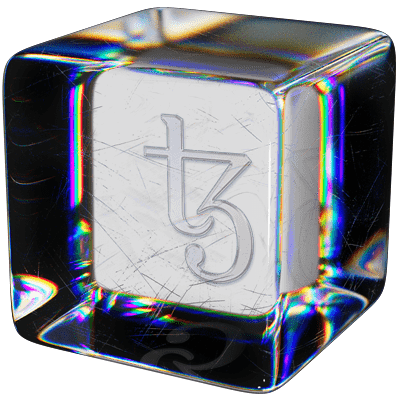
Tezos
You can safely stake your Tezos
by following the external link to the resource
Tezos
EVERSTAKE validator address
Delegating step-by-step
Why stake Tezos with Everstake?
- Everstake is a leading staking service provider, trusted by over 735,000 users across 70+ blockchain networks. Our extensive involvement extends across various crypto projects, actively supporting the health of the ecosystems we endorse. Throughout our journey, we've upheld an outstanding record in preventing slashing, ensuring uptime, and delivering optimal performance.
- Delegating XTZ with baker Everstake will help you to increase your yields. Tezos Delegated Proof of Stake blockchain network requires a high-end node setup, with powerful hardware, well-maintained software, and a stable and fast Internet connection. Any of these factors contribute to the yields, and if something is far from perfect, you will end up in losses. Everstake is on guard of making Tezos staking hassle-free. We have a highly experienced engineering team with hands-on expertise in PoS staking spanning from its very beginning.
How can I stake Tezos with Everstake?
- Step 1. Select a wallet that offers staking functionality
- Step 2. Choose Everstake as your validator
- Step 3. Delegate your XTZ tokens
- Step 4. Get rewards
- Note: Validators do not have control over users' funds in blockchain networks. Validators are responsible for validating transactions and adding them to the blockchain, ensuring the integrity and security of the network. However, they do not have the authority to access or control users' funds.
Where can I delegate/stake Tezos?
Delegation details
- Cycle duration: 1 day
- First reward info: In 4 days
- Receiving reward: From baker
- Reward frequency: Per cycle
- Min amount to delegate: There is no exact minimum amount of XTZ required to delegate
- Everstake fee: 15%
- Locking period: There is no locking period in the Tezos network and your XTZ will be transferable immediately upon undelegating
Staking step-by-step
What is Tezos staking?
- The Tezos network recently experienced a major update called Paris, which introduced a new staking function (before that there was only delegation). Delegating and staking are two different processes.
- Staking represents an advancement of the existing Tezos Liquid Proof-of-Stake mechanism, adding a new role for network participants known as "staker." This role complements the existing "delegate" (also referred to as "baker") and "delegator" roles.
- More significant incentives are offered for staked funds because they actively enhance network security by being at stake. Baking rights, voting power, and rewards of staked funds count twice as much as delegated funds. However, unlike liquid delegation, staked funds are locked and can be subject to slashing depending on the amount added to the selected baker's deposit. Double-baking penalties are set at 5% of the delegate’s stake.
- Additionally, stakers receive rewards directly from the Tezos protocol, whereas delegators receive rewards from the bakers.
How I can stake Tezos with Everstake?
- Step 1. Go to stake.tezos.com
- Step 2. Choose wallet and delegate your tokens
- Step 3. Select Everstake as your baker
- Step 4. Go to the Staking section, enter the amount you want to stake, click on Stake, and Confirm the operation
- Step 5. Get rewards
- Note: Validators do not have control over users' funds in blockchain networks. Validators are responsible for validating transactions and adding them to the blockchain, ensuring the integrity and security of the network. However, they do not have the authority to access or control users' funds.
Which wallets support staking?
Now, staking process is available using the Tezos staking app interface with:
Staking details
- Cycle duration: 1 day
- First reward info: Immediately
- Receiving reward: From protocol
- Min amount to stake: There is no exact minimum amount of XTZ required to stake
- Everstake fee: 8%
- Locking period: 4 days
Blockchain Overviev
Tezos is a blockchain platform designed for smart contracts and decentralized applications (dApps). It aims to provide a self-amending blockchain that can evolve without requiring a hard fork. Tezos uses a liquid proof-of-stake (LPoS) consensus mechanism, where token holders can participate in the consensus process by delegating their tokens to bakers (the equivalent of miners in other blockchain networks) to validate transactions and create new blocks.
One of the unique features of Tezos is its on-chain governance mechanism, which allows stakeholders to vote on proposed protocol upgrades and amendments. This enables Tezos to adapt and evolve over time in a decentralized manner.
Tezos also supports formal verification of smart contracts, which can help ensure their correctness and security. This feature makes Tezos particularly appealing for applications where security and reliability are paramount, such as in finance and healthcare.
Interested in staking more than $500k of XTZ?
Everstake is happy to discuss special staking conditions & services we provide for institutions and large investors. Please contact [email protected] or book a slot for any additional details.
Difference between delegation and staking
faq
Staking and delegating
+The Paris proposal has introduced a new role in the Tezos ecosystem—the staker—alongside the existing roles of delegate (baker) and delegator. Previously, Tezos only offered delegation, where users could delegate their funds to a baker without freezing them. However, with the recent protocol upgrade, classic non-custodial staking has been introduced as a new option.
Staking means that stakers contribute to their chosen baker’s security deposit without transferring custody of their funds. In return, they receive a proportional share of rewards, which are automatically distributed by the Tezos protocol. Unlike liquid delegation, staked funds are frozen and subject to slashing, reinforcing their role in enhancing network security.
Delegation in Tezos Protocol, unlike staking, offers a way to contribute to a baker’s stake without freezing your funds or exposing them to the risk of slashing. However, delegated funds are only half as effective in earning baking rights, rewards, and governance voting. Additionally, rewards from delegated funds are paid to the baker, who then decides on their redistribution.
Read more in our article
Difference between delegation and baking
+Baking is how staking is known on the Tezos. It is the act of signing and publishing blocks to the Tezos blockchain by bakers (validators)
Delegation is when you give your baking rights to a baker.
What is overdelegation?
+Overdelegation it’s when the baker does not have sufficient funds relative to its stake. However, they do not miss the acquired slots because of a lack of security deposit and thus will not slow down the chain anymore.
The over-delegated baker will not maximize its staking power, since more Tez are delegated compared to what it should own (at least 10% of the total staking balance).
Do I need to claim my rewards? Is there compounding?
+In Tezos, delegators' rewards are automatically compounded, so you don't need to re-delegate your rewards.
Where I can check my payouts?
+You can check your payouts directly in the Wallet where you stake your XTZ or within Tezos Explorers.
What is APR and APY?
+APR stands for Annual Percentage Rate. This is the percent that you will receive when staking with a validator. APR should not be treated as constant as it is influenced by a number of factors: the number of nodes, service fee, top-up amount of the pool and of the network, uptime rank. Remember that the more users start staking, the less APR in the network. You may find an actual APR in the explorers mentioned above.
APY stands for Annual Percentage Yield and is the projected rate of annual return after taking compounding interest into account. In order to understand how APY is calculated, it is important to understand compound interest. In essence, compound interest is interest earned on previously earned interest.
How Everstake deduces validator fee?
+“Validator fee” refers to the rewards received by Validator for participating in the Blockchain network Validation process. Everstake determines the validator fee through a process involving analysis and consideration of various factors, such as network requirements, operational costs, and market dynamics.
Control over user's funds
+Validators don't have control over users' funds in blockchain networks. Instead, they validate transactions and participate in the consensus process based on the rules defined by the network protocol. Users retain control over their funds through private keys, which are used to sign transactions and authorize transfers. Validators' roles involve confirming the validity of transactions and blocks, but they don't have the authority to access or manipulate users' funds.
